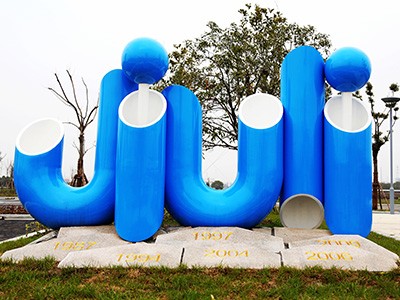In addition to chromium and nickel, molybdenum is also one of the most important alloying elements in stainless steel.
Research has confirmed that in the Marine atmosphere, close to chromium, even chromium as high as nearly 24% is difficult to completely prevent corrosion of stainless steel, must add molybdenum element. However, the premise of the beneficial effect of molybdenum on the corrosion resistance of stainless steel is that the steel must contain sufficient amount of chromium. With the increase of chromium content in steel, the beneficial effect of molybdenum in steel will increase significantly.
Molybdenum can significantly promote the enrichment of chromium in the passivation film, thus enhancing the stability of the stainless steel passivation film, significantly enhancing the corrosion resistance of chromium in steel, thus greatly improving the rust resistance of all kinds of stainless steel and corrosion resistance of various reducing acid media. Fig. 1 As the concentration of H2SO4 increases at different concentrations, the amount of molybdenum increases in order to obtain the same corrosion rate. For corrosion resistance, 50%H2SO4 requires more molybdenum than 75% H2SO4 because 50%H2SO4 is more corrosive.
Molybdenum in stainless steel, can improve the passivation ability of steel, its ability to resist pitting and crevice corrosion is about 3 times that of chromium, in order to resist pitting and crevice corrosion, stainless steel generally need to add molybdenum. Molybdenum is also beneficial in preventing stress corrosion originating from pitting.
The corrosion inhibition effect of molybdenum on stainless steel after molybdate formation in some corrosive media has been proved by experiments.
Molybdenum can promote the precipitation of intermetallic compounds in stainless steel, such as σ and χ, so as to reduce the thermal stability of the steel, increase the brittle sensitivity of steel, reduce the plastic, toughness, corrosion resistance, cold forming and weldability of steel.
Molybdenum improves the strength of stainless steel, including the high temperature strength, so that the high temperature endurance and creep properties are greatly improved. However, with the increase of molybdenum content, the high temperature deformation resistance of stainless steel increases, and the thermoplasticity decreases. Meanwhile, molybdenum also promotes the formation of δ-ferrite in austenitic stainless steel. All these factors can lead to the decrease of hot working and hot forming property of steel. (From Introduction to Stainless Steel)


















